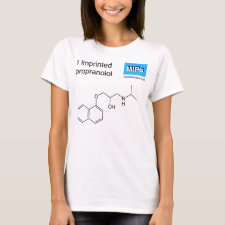
Authors: Pérez-Moral N, Mayes AG
Article Title: Direct rapid synthesis of MIP beads in SPE cartridges.
Publication date: 2006
Journal: Biosensors and Bioelectronics
Volume: 21
Issue: (9)
Page numbers: 1798-1803.
DOI: 10.1016/j.bios.2005.08.014
Alternative URL: http://www.sciencedirect.com/science/article/B6TFC-4HBTDD6-1/2/ed137738019ed33498a055110e276b42
Abstract: Selecting optimal compositions for non-covalent molecularly imprinted polymers (MIPs) and screening for appropriate rebinding conditions necessitates synthesising a large number of polymers. This is extremely labour-intensive and usually results in very limited "optimisation" in studies of MIPs. Here, a new method is proposed for rapid synthesis of MIPs in a beaded form that can be used directly in many different performance evaluation studies. The method is based on synthesis of spherical particles by suspension polymerisation in liquid fluorocarbon [Mayes, A., Mosbach, K., 1996. Molecularly imprinted polymer beads: suspension polymerisation using a liquid perfluorocarbon as the dispersing phase. Anal. Chem. 68, 3769-3774]. The polymers were directly polymerised under UV light in solid phase extraction (SPE) cartridges, then washed and extracted in the same cartridges where they had been synthesised, resulting in a rapid and automatable process that requires no transfer or manipulation of the polymer particles. The particles were similar in terms of size, morphology and functional performance to particles obtained by suspension polymerisation in fluorocarbon solvent using a conventional reactor. In this initial study, 36 polymers were synthesised to study the effect of a variation in the type and amount of four different functional monomers, methacrylic acid (MAA), acrylic acid (AA), hydroxyethyl methacrylate (HEMA) and 2-vinylpyridine (2-VPy), for the imprinting of propranolol and morphine. The performance of polymers synthesised using MAA was as expected, but those synthesised with AA as functional monomer showed more surprising rebinding properties as a function of monomer to cross-linker ratios, demonstrating the potential value of pragmatic synthesis and screening approaches to polymer optimisation
Template and target information: morphine, propranolol
Author keywords: imprinted polymer, Optimisation, Suspension polymerisation, Rapid synthesis



Join the Society for Molecular Imprinting

New items RSS feed
Sign-up for e-mail updates:
Choose between receiving an occasional newsletter or more frequent e-mail alerts.
Click here to go to the sign-up page.
Is your name elemental or peptidic? Enter your name and find out by clicking either of the buttons below!
Other products you may like:
 MIPdatabase
MIPdatabase









